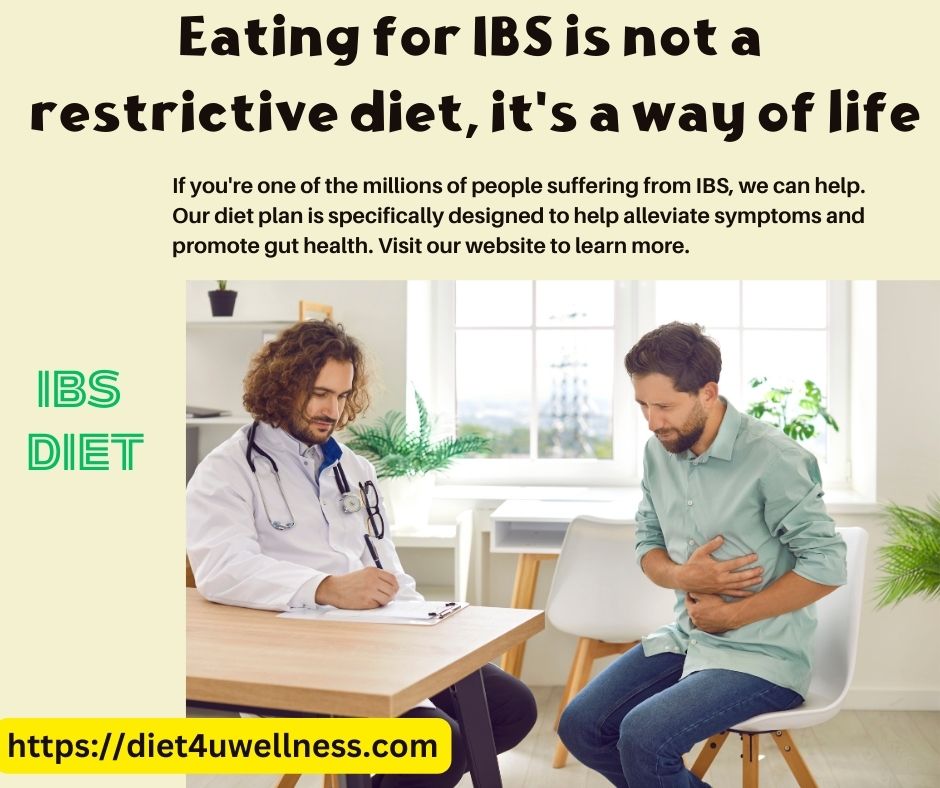
Eat Right, Feel Right: Crafting an Effective IBS Diet Plan
Table of Contents
When suffering from any sickness, avoiding certain meals to live in shape is far cautioned. For instance, diabetic patients are forbidden to devour sweet dishes, and human beings stricken by colds and coughs are prohibited from eating cold meals. Similarly, within the present time, if any individual has the problem of IBS, he initially wishes to modify his diet plan and everyday routine.
Nowadays, Irritable Bowel Syndrome, additionally referred to as IBS, is one of the most unusual global sicknesses. IBS influences nearly forty-five million people within the U.S. And about 10% to 15 % of the worldwide population, according to the International Foundation for Gastrointestinal Disorders.
IBS is a long-term gastrointestinal disorder that affects the large gut. In well-known, it significantly impacts humans under forty-five years of age and more often influences women than men. Today, Diet4u Wellness will inform you of the simplest Indian Diet Chart for IBS Patients to follow. You will also get facts about what to devour, what to avoid, what irritable bowel syndrome diet, what type of food plan is suitable for IBS, delicate veggies or results for IBS, and more.
If a person is affected by Irritable Bowel Syndrome (IBS), this food plan can be genuinely beneficial for them.
Let’s begin with the meaning of IBS , Its signs , symptoms and Diet for IBS.
What is IBS ( IRRITABLE BOWEL SYNDROME)
IBS, or Irritable Bowel Syndrome, is a common digestive disorder that affects the large gut. It can cause various symptoms consisting of belly pain, bloating, fuel, diarrhea, and constipation. Unlike a few digestive situations, IBS does not cause irritation or damage the digestive tract. However, it can appreciably affect a person’s ability to exist and participate in everyday sports due to the soreness and unpredictability of symptoms.
Understanding IBS Symptoms
IBS signs and symptoms can range from man or woman to man or woman and might fluctuate in severity over time. While some individuals can also revel in slight pain, others might also have extra debilitating symptoms that notably affect their exceptional life. Recognizing these symptoms is critical for early intervention and step-forward outcomes.
Types of IBS Symptoms
Gastrointestinal Symptoms of IBS
- Abdominal Pain and Cramping- One of the hallmark signs and symptoms of IBS is stomach pain or discomfort. This ache is frequently defined as cramping and may range from slight to intense. It can be relieved via passing gas or having a bowel motion.
2. Bloating and Gas – Many people with IBS experience bloating and extended gas production. This can result in feelings of fullness and soreness, often worsened after meals.
3. Diarrhea- IBS-D, or diarrhea-essential IBS, is characterized by common episodes of unfastened or watery stools. These episodes can be accompanied by urgency and an experience of incomplete bowel actions.
4. Constipation – In comparison, IBS-C, or constipation-principal IBS, is characterized by using rare bowel actions and difficulty passing stools. Individuals may also enjoy straining and belly soreness.
Non-Gastrointestinal Symptoms of IBS
- Fatigue – Chronic fatigue is a common complaint among people with IBS. This may be because of disrupted sleep styles, underlying irritation, or the body’s response to continual signs and symptoms.
2. Difficulty Sleeping – Sleep disturbances, such as insomnia and everyday awakenings, are frequent in people with IBS. Discomfort from gastrointestinal signs, symptoms, and psychological distress can contribute to sleep disturbances.
3. Anxiety and Depression – IBS is regularly related to anxiety and melancholy. The continual nature of the situation, coupled with its impact on everyday functioning, can cause psychological distress and mood disorders.
Cause of Irritable Bowel Syndrome (IBS)
Irritable Bowel Syndrome (IBS) is a common gastrointestinal sickness characterized by a cluster of signs that may notably disrupt someone’s everyday lifestyle. While the exact motive of IBS remains elusive, several factors are believed to have contributed to its development. Understanding those underlying causes is crucial in efficiently coping with and treating this condition.
Genetic
Predisposition
One ability motive of IBS is genetics. Research indicates that
people with a family history of IBS are more likely to broaden the
condition themselves. Although specific genes related to IBS have not been
recognized, inherited elements can also play a role in figuring out susceptibility to
the ailment.
Abnormal
Gastrointestinal Motility
Another contributing component to IBS is peculiar gastrointestinal
motility, which refers to irregular digestive tract moves. In a few
humans with IBS, the muscular tissues in the intestines may additionally agree too strongly or too
weakly, leading to symptoms such as diarrhea or constipation. These motility
disturbances can disrupt the normal functioning of the digestive gadget and
contribute to the developing of IBS.
Post-Infectious
IBS
Some cases of IBS can also increase following a about of
gastroenteritis is a circumstance typically caused by bacterial or viral infections.
This sort of IBS, known as submit-infectious IBS, takes place when the
gastrointestinal tract becomes sensitized and hypersensitive to certain stimuli
after an infection. The ensuing infection and modifications in gut microbiota
can cause signs of IBS, including belly pain, bloating, and adjusted
bowel conduct.
Importance Of IBS Diet Plan
Diet plays a crucial function in coping with IBS signs. Many individuals discover that positive foods can trigger or worsen their signs, while others can also assist in alleviating discomfort. Understanding these nutritional factors is essential for efficiently dealing with the IBS diet chart.
Importance of Diet in Managing IBS Symptoms
For individuals with IBS, sure meals can exacerbate signs together with bloating, gasoline, and abdominal pain. Conversely, a well-balanced weight-reduction plan can help regulate bowel movements and alleviate soreness. Individuals can highly manipulate their signs and improve their ordinary well-being by identifying and keeping off trigger foods.
Trigger Foods for IBS
Everyday trigger meals for IBS encompass high-FODMAP ingredients such as onions, garlic, wheat, and specific results and vegetables. These ingredients incorporate fermentable carbohydrates, which could contribute to gas and bloating in individuals with sensitive digestive systems. Additionally, caffeine, alcohol, and highly spiced meals may worsen signs in some individuals.
The Connection Between Gut Health and Diet
The gut microbiota plays an enormous role in digestive fitness and immune characteristics. Certain dietary styles, such as excessive fiber-rich foods and probiotics, can promote a wholesome balance of gut bacteria. Conversely, diets extreme in processed foods and sugar can disrupt this balance and contribute to gastrointestinal troubles like IBS.
Recommended Diet for IBS Patients
Low-FODMAP Diet for IBS
A low-FODMAP eating regimen is regularly endorsed for individuals with IBS to discover and cast off trigger ingredients. FODMAPs are brief-chain carbohydrates poorly absorbed inside the small intestine, leading to fermentation and gasoline manufacturing inside the colon. By restricting high-FODMAP ingredients quickly, individuals can pinpoint which meals exacerbate their symptoms and tailor their weight loss plan accordingly.
High-Fiber Diet FOR IBS
Fiber is essential for maintaining everyday bowel movements and selling digestive health. However, a few people with IBS can be touchy with certain types of fiber, consisting of insoluble fiber in wheat bran and a few culmination and veggies. Soluble fiber, then again, can help alleviate constipation in IBS sufferers by adding bulk to the stool and selling regularity. Fiber is good in the IBS Diet chart.
Probiotics and Fermented Foods for IBS DIET
Probiotics are beneficial bacteria that may assist in repairing balance in the gut microbiota and alleviate symptoms of IBS. Fermented foods, which include yogurt, kefir, sauerkraut, and kimchi, are rich resources of probiotics and may be included in the food regimen to aid digestive health. Additionally, probiotic supplements are needed for those needing more probiotic-rich ingredients.
Foods to Avoid with IBS DIET
High-FODMAP Foods
High-FODMAP foods must be avoided or limited in individuals with IBS, as they can trigger symptoms consisting of bloating, gasoline, and stomach aches. Common high-FODMAP ingredients consist of sure results (apples, cherries, watermelon), greens (onions, garlic, broccoli), legumes (beans, lentils), dairy merchandise, wheat, and synthetic sweeteners.
Dairy Products
Dairy products incorporate lactose, a sugar that may be hard for individuals with IBS to digest. Consuming dairy products can lead to symptoms together with bloating, gas, diarrhea, and belly cramps in people with lactose intolerance. Switching to lactose-free or plant-based options can assist in alleviating digestive discomfort.
Fried and Greasy Foods
Fried and greasy ingredients are high in fats, which can slow digestion and exacerbate signs of IBS, causing bloating and stomach soreness. These meals also can worry the digestive tract and might irritate sensitive individuals. Opting for grilled, baked, or steamed options can assist lessen digestive misery.
Lifestyle Changes to Support Diet in Managing IBS
In addition to dietary adjustments, positive lifestyle adjustments can help manage IBS signs and symptoms.
Stress Management Techniques for IBS Patients
Stress is a common cause of IBS signs and may exacerbate digestive pain. Practicing strain control techniques, which include deep respiratory, meditation, yoga, and mindfulness, can assist in reducing strain stages and selling rest, which may additionally alleviate symptoms of IBS.
Regular Exercise Benefits for IBS Patients
Regular physical activity benefits average fitness and may help alter bowel movements in individuals with IBS. Exercise stimulates the muscular tissues of the digestive tract, promoting extra efficient digestion and lowering symptoms such as constipation and bloating. Aim for at least 30 minutes of moderate exercise, maximum days of the week.
Importance of Hydration
Proper hydration is vital for maintaining healthful digestion and stopping constipation, a not unusual symptom of IBS. Drinking hookah water for the day facilitates melt stools melting promotes regular bowel movements. Aim to drink at least eight glasses of water daily and avoid the immoderate intake of caffeinated and alcoholic liquids that may contribute to dehydration. It is perfect for the IBS Diet.
IBS Diet chart/ IBS Diet Plan
Morning:
- Start your day with a cup of warm water with a squeeze of lemon.
- Have a small bowl of cooked rice with mashed ripe banana.
Mid-Morning Snack:
- Enjoy a handful of soaked almonds or walnuts.
Lunch:
- Opt for khichdi, made with rice and lentils and flavored with cumin seeds, ginger, and a pinch of asafoetida.
- Include a side of yogurt with a sprinkle of roasted cumin powder.
Afternoon Snack:
- Snack on a small portion of papaya or ripe guava.
Dinner:
- Cook a light vegetable curry with easily digestible vegetables like bottled gourd, carrots, and spinach. Pair it with roti made from whole wheat flour.
Before Bed:
- Sip on a cup of warm turmeric milk.
\
FAQs Regarding IBS Diet
Q:- Can stress worsen IBS symptoms?
A: Stress can cause IBS symptoms by altering gut mobility and sensitivity.
Q: – Are there any particular diets that are recommended to treat IBS?
A :- Absolutely, dietary regimens that are low in FODMAPs and rich in fiber are usually suggested to manage IBS symptoms.
Q:- Can IBS be treated?
A:- Although there isn’t a cure for IBS, the IBS symptoms can be controlled through lifestyle and diet modifications.
Q:- Are medications necessary to treat IBS?
A:– Sometimes, medications may be prescribed to treat specific symptoms or treat other conditions that are that are associated with IBS.
Q: – How long does an IBS flare-up ordinarily last?
A:- Duration of an IBS flare-up may vary from a few days to a few weeks based on the the triggers and individual factors.
Q:- Can IBS affect mental health?
A:- Living with IBS can indeed hurt mental health because of the ongoing nature of the illness and its effect on daily life.

Hello My Name is Dt. Ruksana Azhar and I am a certified dietician and providing online & offline services for Weight Management, PCOS/PCOD Management, Diabetes Management , etc. I have 12+ years of experience in the Apollo Hospital Delhi , Max Super Specialty Hospital Delhi, Lilavati Hospital Mumbai and VLCC healthcare Mumbai. I loves to write healthcare and lifestyle related blog. My favorite part of being a doctor is the opportunity to directly improve the health and wellbeing of my patients and to develop professional and personal relationships with them.



